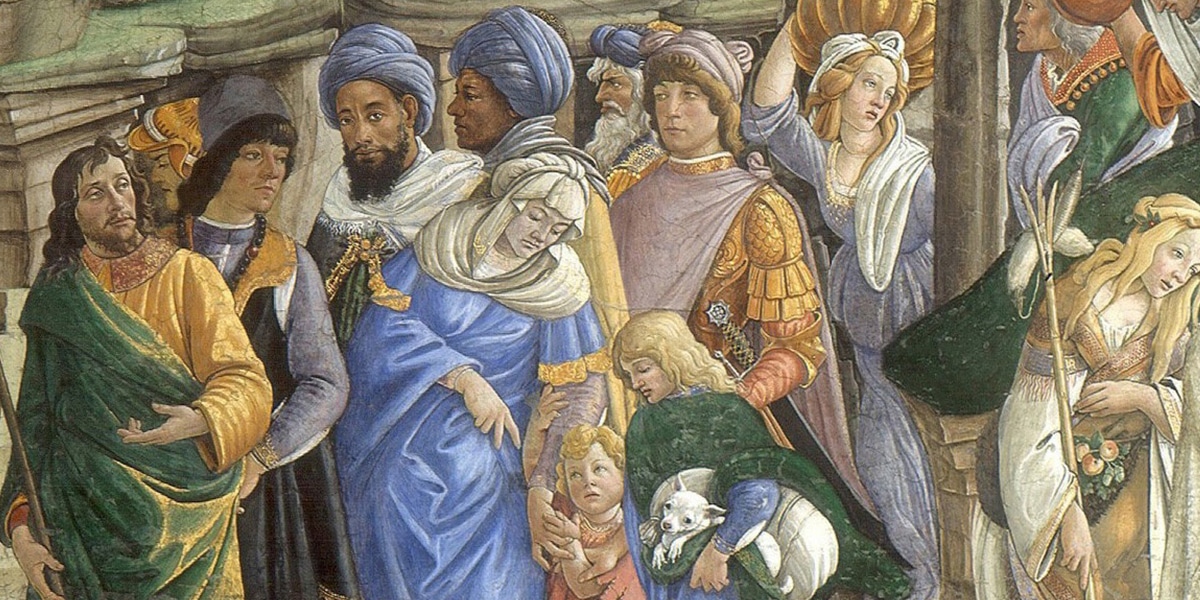Their remarkable stories can inspire us to serve God better.
We are all on a journey of faith. As we walk this journey, we look for models and guides along the way. Of course, we have the words of Jesus and his many followers throughout the ages. Sometimes, though, we forget about the many biblical figures who can help us. Perhaps any one of us could readily name some worthy candidates from the New Testament, especially from the Gospels. But let’s not forget the Old Testament, telling the grand tradition of faith over thousands of years.
These models from the Hebrew Scriptures can inspire us today. Let’s consider a few of them. Some may be familiar; others are less known. Some of them are not named at all. But does that really matter? Their remarkable stories can still inspire us to serve God better.
Jacob: Put God First
Let’s begin with a familiar figure: Jacob, brother of Esau and son of Isaac. It may come as a surprise to know his story embraces no less than half the Book of Genesis. Beginning with chapter 25, we literally follow this patriarch’s life from birth to death. When he makes his entrance into this world, Jacob is trying to get ahead; he has a firm grip on the heel of his older brother, already trying to claim the benefits of the firstborn for himself!
That scene gives us an important clue to the way Jacob will prefer to act in life. Consider these peak moments in Jacob’s life story. He insists Esau surrender his birthright for a bowl of lentil stew (Gn 25). He barters with Laban, working an extra seven years to gain the hand of Rachel (Gn 29). He even insists on winning in his struggle with a heavenly visitor (Gn 32).
Of course, there is a heavy price to pay for having things his way all the time. His preference for Rachel’s son Joseph creates so much animosity among his other sons that Joseph ends up being sold by them into slavery. As a result, it seems Jacob has lost Joseph forever. But by God’s mysterious ways, losing Joseph turns out to be the best thing for Jacob’s spiritual progress.
We all know Joseph’s story; his coat of many colors has always been a popular detail, inspiring many retellings. But Joseph’s vivid dreams make a most dramatic contribution to Jacob’s story. They forecast what God will bring about to heal the family and make Jacob a true patriarch.
Joseph’s first dream—about the stalks of wheat—forecasts what Joseph will do for the family physically, feeding them in time of
famine. The second dream—about the sun, moon, and stars—forecasts what he will do for the family spiritually. If created lights bow before another light, that light must be even brighter. What would be brighter than any created light? The light of faith, of course. And indeed, Joseph becomes a beacon of light for his family, guiding them back to the Promised Land. Jacob, however, plays a big part in the fulfillment of this second dream.
Through his separation from Joseph, Jacob gradually becomes less focused on himself and more focused on all his children. We can see this transformation begin to surface in the exchange with his sons in Genesis 42 and 43. In 42:38, he refuses to allow them to take Benjamin to Egypt; in 43:13, he allows it. Significantly, he refers to Benjamin no longer as “my son” but as “your brother.” The family bonds are growing stronger in Jacob’s eyes.
When at last Jacob himself arrives in Egypt, he is determined to awaken in Joseph an appreciation for the Promised Land. Joseph resists his father’s efforts initially because he imagines his future lies in Egypt. But in the end, Joseph embraces his father’s viewpoint; his dying wish is that his final resting place be in the Promised Land.
Jacob lost Joseph only to win him back in a more significant way. Jacob became a spiritual mentor for his entire family, as well. In Genesis 49, he has a blessing for each of his 12 sons, expressing what each of them needs to make spiritual progress.
What can we take away from Jacob’s journey of faith? He teaches us to put God first in our lives. Like Jacob, we have our personal interests. But also like Jacob, we can discover that putting the interests of God first will give us a better perspective on everything else, including family.
Elisha: Ask for God’s Help
Another figure we can learn from is Elisha, who is sometimes regarded as a person of little importance among the prophets. He certainly does seem to be overshadowed by his mentor, the great prophet Elijah, who gets loads of attention. Elijah enters the biblical scene with a bang, suddenly appearing, it seems, out of thin air. Then come all those special effects. Who can forget that flash of divine fire eating up the offering, wood, and even the stones of the altar in 1 Kings 18:38? Elijah makes a dramatic exit, too. He goes up in a whirlwind, leaving poor Elisha to scramble about for anything the great man of God may have left behind (2 Kgs 2:11–13).
But keep this in mind—Elisha had the smarts to ask for a double portion of the spirit resting on his mentor, Elijah. He wanted to serve God twice as much as Elijah did. That is a bold request! It might seem a bit self-serving, too, until we see the quality of Elisha’s service to God in subsequent chapters, where he acts as an agent of life for people.
In one story, a deeply spiritual woman invites the prophet to visit with her family in a place called Shunem. In return for her generosity, Elisha announces that God will bless her with a son. Her response shows how much faith she has. It seems she worried that one day she would be left alone in the world with no family to care for her. Elisha’s concern for her is exhibited again when he pleads to God to restore her son to life and, later still, when as an agent of God, he protects her from a famine in the land (2 Kgs 8:1–2).
Elisha proves to be an agent of life for many others, too. A widow fears her two sons will be sold into slavery, but through the word of Elisha, God provides for them (2 Kgs 4:1–7). When student prophets fear they have been poisoned, Elisha removes all danger (2 Kgs 4:38–41). In yet another event, a servant to Elisha fears there may not be enough food to feed them all. Through the power of God, Elisha announces all will be satisfied with fragments left over (2 Kgs 4:42–44).
Perhaps the most celebrated account of Elisha as an agent of life is his healing of Naaman the leper. Initially Naaman, a great Syrian general, allows his pride to get the best of him. But once he sets pride aside and washes in the Jordan River, he emerges a new man. Naaman’s healing reaches down to his very core (2 Kgs 5:9–15).
Elisha extends this lesson of humility to others, as well. When pride gets the better of some student prophets, he tells them that if they want to learn, they must take direction from the hand of the prophet (2 Kgs 6:1–7). Elisha does the same for a king. If the king allows the hand of the prophet to guide his own hand, he will never suffer defeat from those who seek to harm him (2 Kgs 13:14– 19).
In scene after scene, Elisha brings spiritual benefits to the lives of others. He did indeed receive a double portion of the spirit of his mentor. And in Elisha we have a model for our own lives. We, too, can be agents of life; the first step is asking God to help us.
Jacob and Elisha are prominent characters in the Bible. But there are others for whom we do not even have a name. Such is the case with the next spiritual companion.
The Unnamed Girl: Awaken Others to Faith
In the story of Naaman the leper, a young girl who has no name is mentioned, appearing only briefly in the chapter. This daughter of Israel is a servant in Naaman’s household. One day she suggests that if the great general were to meet the prophet in her homeland of Israel, he would be cured of his leprosy (2 Kgs 5:2– 3). In the very next verse, her words are being repeated in the royal court of Syria, and Naaman is soon on his way for a cure. We might
have forgotten the young servant girl altogether, but when the general emerges from the waters of the Jordan, we are told that his skin was restored to him “like the flesh of a child.” And so we are reminded of the child servant who spoke about the healing power of the prophet, and thus launched the dramatic events that changed Naaman’s life for the better on many levels.
From this faith-filled servant we learn an important lesson. By God’s grace, the words we speak to others may set them on a path leading them closer to God. We may never know the good influence a few words from our lips has on other people. But does that really matter? What matters is that our words are always serving God.
The Psalmist: Always Seek God’s Guidance
Our final spiritual companion is another figure with no name. This one does not even make an appearance in the Bible as a character within a story. All we know of this model of faith comes from the words of a psalm. But if we read carefully, we can make out the profile of a spiritual giant.
The lyrics of this song of praise to God take up 176 verses, making Psalm 119 by far the longest of the psalms. That large number of verses is no accident. By design, the song proceeds in increments of eight lines, and each unit begins with a successive letter of the Hebrew alphabet—aleph, beth, gimel, etc. This might seem a very mechanical way to go about crafting a hymn of praise. On the other hand, we could regard it as very thorough, including everything—as we would say—from A to Z. What does the psalm treat so thoroughly? It traces someone’s spiritual awakening. Let’s walk alongside this model of faith, and look at some of the key moments in that awakening.
At the outset, the psalmist dreams of walking steadily through life, guided by the word of God. And isn’t this our goal, too? Achieving this would take so much fear out of the journey. Is this even possible? The psalmist thinks so and is prepared to give it a try.
Initially the psalmist feels bound to the dust of the earth, but he knows where to go for a remedy. He decides to bond with God’s word, which will ensure a good run along the path of life (119:25–32). In another section, he has a list of special requests to make to God. At the top of the list, he asks God to be the teacher. With God as instructor, the psalmist will have more understanding than any mortal teacher could provide (119:99). As Psalm 119 proceeds, he keeps making steady progress. He knows the word of God is the lamp that illumines the way (119:105).
At 119:125, the psalmist can at last declare to God with confidence, “I am your servant.” From this point on, he takes big steps in the journey of faith, trusting that God’s face is shining down (119:135) and that God stands close by (119:151). He asks God for life three times in close succession (119:154, 156, and 159) and prays seven times a day (119:164). The psalmist knows God will answer because this servant has chosen God’s precepts, longs for God’s salvation, and delights in God’s commands (119:173–174). The psalmist has turned his heart over to God.
Imagine the encouragement we can gain by walking with the psalmist—indeed, all of these Old Testament figures—step by step. They can help lead us on our own faith journeys as we follow their lessons for life: put God first, ask for God’s help, and never underestimate the power of your faithful witness. It’s not an easy path, but one beyond value.








